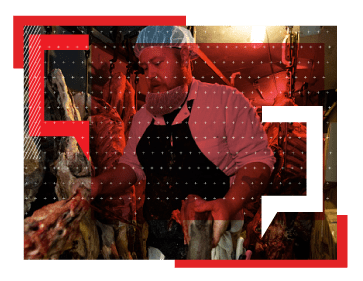If you had the pleasure of having a BBQ this Memorial Day, you may have noticed those burgers you grilled up were more expensive, if they were even at your store at all. In this week’s edition of the intelligence briefing, we dive into America’s changing appetite during the pandemic. With a focus on the meat industry, we look at what the future of protein may look like, analyze whether this food source should be considered “essential,” and consider the role of the people and companies who produce it. As the trend of high protein diets, like Keto and Paleo, continue to gain traction in the U.S., what could a meat shortage mean for carnivores?

Want to go a bit deeper? Check out our debate “Don’t Eat Anything With A Face.”
-That’s Debatable: Is it time for the end of meat?
-Intelligraphic: America’s Meat Supply Strain
-Points of View: Insights and analysis from past debater
-Double Digits: 4,000
-A Question for you: Have your eating habits changed during the pandemic?
Sign up hereto find us in your inbox each week and if you like what you read, consider sharing our newsletter with a friend here. You can always reach us at info@opentodebate.org with ideas and feedback.
THAT’S DEBATABLE
Two perspectives on one of the nation’s biggest debates this week.
The Future is Meatless

Regardless of how you have been getting your groceries during the pandemic, you have likely noticed disruptions in some of your regular staples: flour, yeast, grains, toilet paper. The pandemic has upended supply chains around the world, and the meat industry is no exception: Meatpacking facilities across the nation face continual coronavirus outbreaks, with sustained meat shortages expected. As meat prices are beginning to soar, some experts are considering whether this pressure in the supply chain will be met with innovation, or a rupture in American’s relationship with the prime source of protein.
For Continued Meat Production:
Covid-19 Makes the Case for More Meatpacking Robots:“The coronavirus has hit meat processing plants hard. But not in Denmark, where automation makes for safer slaughterhouses.” – Megan Molteni
Against Continued Meat Production:
The End of Meat Is Here:“The combination of meat shortages and President Trump’s decision to order slaughterhouses open despite the protestations of endangered workers has inspired many Americans to consider just how essential meat is.” – Jonathan Safran Foer
INTELLIGRAPHIC
America’s Meat Supply Strain In a small town in northern Texas, nearly a fourth of the population works at one of the largest beef processing facilities in the United States. The town now has a coronavirus infection rates ten times higher than that of large cities. Some attribute the unique combination of close quarters, long hours, and cold conditions to the outbreaks seen in meatpacking facilities across the country. How is stunted output, in the meat industry and beyond, affecting American retail and consumer activity?

DOUBLE DIGITS
When one number tells two stories.
4000
The number of Coronavirus-related complaints issued to the Occupational Safety and Health Administration (OSHA) Under the Defense Production Act, many critical sectors of the economy, including manufacturing and food suppliers, have been ordered to remain operational during the pandemic. While debates over which sectors are “essential” wage on, many workplaces have proven to be unsafe, leaving employers to juggle between losses and the guaranteed safety of their workers. Can businesses strike a balance between resuming operations and fulfilling the demand of American consumers while maintaining the safety of their employees?
For Employees:
The LA Times:Worried about getting the coronavirus at work? Here’s what you can do.
The National Law Review:Knock-Knock, OSHA is Here! How to Respond to an OSHA Complaint in the Wake of COVID-19
POINTS OF VIEW
Top insights and news from the intellectual leaders who have battled it out on the Open to Debate stage.
–
Nouriel Roubini predicted the 2008 crash. Now the economist known as “Dr. Doom” warns of bleak times ahead and argues that we’re headed for a decade-long “Greater Depression.”(New York Mag, Nouriel’s debate)
–
Yascha Mounk offers a more optimistic take. He suggests we should prepare for the Roaring Twenties and a new era of change and innovation. (The Atlantic, Yascha’s debate)
-What happens when couples disagree over coronavirus risks? Jessica Grose investigates how parents handle the debate at home. (The New York Times, Jessica’s debate)
-Are we all in this together? Rajan Menon explores the impact of the coronavirus pandemic across various social and political lines. (Boston Review, Rajan’s debate)
-Coronavirus may change the way kids speak. John McWhorter observes that children in bilingual homes may become more fluent in their parents’ language.(The Atlantic, John’s debate)
A QUESTION FOR YOU
Have your eating habits changed during the pandemic?
YES
NO
If so, how?
Tweet at @opentodebate and let us know where you stand!














